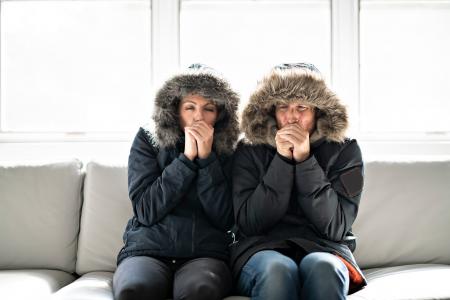Winter Safety Tips
 Keeping warm: heating pads, electric blankets and space heaters
Keeping warm: heating pads, electric blankets and space heaters
Electric space heaters and blankets are great ways to stay toasty warm when the temperature drops. But don’t forget about safety before you plug in these chill-chasers. During these winter months, when space heaters and electric blankets come out of hibernation, home fires increase.
Remember: an electric space heater is a temporary option for supplemental heat. Many homeowners may use this option to heat specific rooms while they sleep, but this is unsafe. When you leave a room or go to sleep, it is important to turn off your electric space heater. If you’re leaving it unattended, it could overheat or fall. It is also important to always plug space heaters directly into a wall outlet. Never use an extension cord to avoid overheating.
Electric blankets and heating pads are also popular during the cold months. Never fold them and avoid using them while sleeping. Inspect them for dark, charred or frayed spots, and check to see if the electric cord is cracked or frayed. Be sure to read the manufacturer’s instructions and warning labels carefully before using them in your home.
While there is no risk for carbon monoxide poisoning with an electric space heater, it holds many other safety hazards if not used properly. In accordance with fire safety, install smoke alarms on every floor of your home and outside all sleeping areas. If you already have them, be sure to test them once a month to be sure they’re working properly.
Don’t let your guard down if you keep yourself or your home warm with an electric space heater, electric blanket or a heating pad. By following these tips, you and your family have a better chance of avoiding significant fire and electric shock hazards.
• DON’T leave a space heater or electric heating blanket unattended. Turn it off when you’re leaving a room or going to sleep.
• DO inspect heaters for cracked or broken plugs or loose connections before each use.
• DON’T use the heater if plugs are frayed, worn or damaged.
• DO keep heaters at least three feet away from anything that can burn, including papers, clothing and rugs.
• DON’T use an electric blanket if there are dark, charred or frayed spots.
• DO plug space heaters directly into a wall outlet. Do not use an extension cord which could overheat and result in a fire.
• DON’T use electric blankets while sleeping or as a mattress pad.
Preparing for winter storms
Northern Indiana weather can be unpredictable, especially during the winter months. That’s why you should prepare for dangerous situations before a storm hits. It is especially important to develop a plan for prolonged power outages during these harsh months. Heavy snows, freezing rain and ice storms can all create electrical hazards.
Due to these dangerous conditions, many residents may be confined to their homes for days at a time. That’s why it is important to have a plan in place, especially during these prolonged outages. To better prepare you and your family for a power outage, your electric co-op recommends members keep a storm preparedness kit fully stocked. The basic supplies in this kit should include:
- Bottled water
- Non-perishable food
- Emergency blankets
- First aid kit/medicine
- Flashlight
- Battery operated or hand-crank radio
- Extra batteries
- Toiletries
Now that your family is prepared for a prolonged outage, what should you do if the lights do go out?
While indoors, many will turn their focus to staying warm. If homes are not using a generator, keep warm air in and cool air out by not opening doors to unused rooms. Do not open doors to the outdoors unless necessary.
Food safety is also important when there is a prolonged outage. Keep refrigerator and freezer doors closed as much as possible, and eat perishable food first. If you know a winter storm is coming, stock up on ice so that you can keep things in coolers to keep them from going bad if an outage lasts longer than a day. Once the refrigerator reaches temperatures higher than 40 degrees Fahrenheit, foods can become unsafe to eat.
To protect homes’ electrical equipment during an outage, turn off and unplug all unnecessary electronics or appliances. This will keep equipment from being damaged by surges or spikes when the power returns.
Once an outage is over, there are still safety precautions to take. Electrical power lines could still be down. If you see downed power lines, do not touch them. Call your local REMC or 911.
Make sure your homes and families are prepared for winter storms this season, and avoid electrical hazards that may be common this time of year.
Preparing your car for winter safety
Remember these tips when preparing your car for winter weather
- Install winter wipers. Just be sure to remove them once spring rolls around.
- Install winter tires. If you can see your breath, it’s time to install winter tires.
- Keep washer fluid full. Consider keeping a spare bottle or two in the trunk.
- Maintain proper tire pressure. You should check pressure more regularly during winter and refill your tires as needed.
- Keep the gas tank at least half full. A full tank can help prevent gas line freeze ups. Not only that, but if you’re ever stranded, your engine may be the only thing to keep you warm until help arrives.
- Keep your rear-window defroster in working order. Being unable to see behind you could create unsafe driving conditions.
- Pack a winter safety kit: ice scraper, bag of sand and a shovel, cell phone, flares, first aid kit, flashlight and batteries, jumper cables, warm clothing, non-perishable food and beverage items.

 Keeping warm: heating pads, electric blankets and space heaters
Keeping warm: heating pads, electric blankets and space heaters